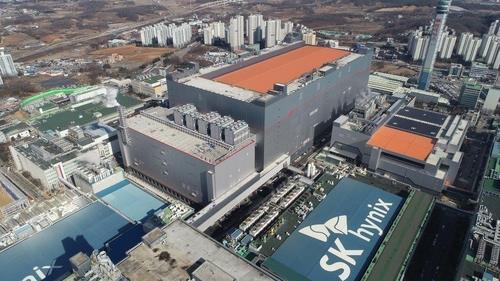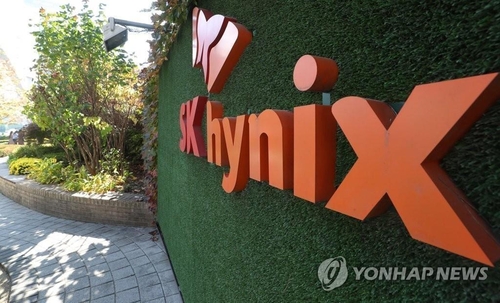- California Assembly OKs highest minimum wage in nation
- S. Korea unveils first graphic cigarette warnings
- US joins with South Korea, Japan in bid to deter North Korea
- LPGA golfer Chun In-gee finally back in action
- S. Korea won’t be top seed in final World Cup qualification round
- US men’s soccer misses 2nd straight Olympics
- US back on track in qualifying with 4-0 win over Guatemala
- High-intensity workout injuries spawn cottage industry
- CDC expands range of Zika mosquitoes into parts of Northeast
- Who knew? ‘The Walking Dead’ is helping families connect
SK hynix reports 60 pct drop in Q3 profit, cuts 2023 investment by half amid chip downturn
SK hynix Inc. reported its third-quarter earnings Wednesday, falling short of analysts’ expectations on the top and bottom lines, amid a cyclical downturn of the global semiconductor industry.
The chipmaker’s third-quarter net income was 1.1 trillion won (US$769.4 million), down 66.7 percent from a year earlier, according to a regulatory filing.
Operating profit for the three months ending in September came to 1.65 trillion won, compared with 4.17 trillion won a year ago. Sales fell 7 percent to 10.98 trillion won.
The earnings missed market expectations. The average estimate of net profit by analysts was 1.83 trillion won, according to a survey by Yonhap Infomax, the financial data firm of Yonhap News Agency.
SK hynix makes most of its profits from selling memory chips, but the macroeconomic woes, including the ongoing war between Russia and Ukraine, soaring inflation and rising interest rates, led consumers to tighten their spending on electronics products that need such semiconductors.


This file photo provided by SK hynix Inc. on Feb. 1, 2021, shows the company’s M16 fab in Icheon, some 50 kilometers southeast of Seoul. (PHOTO NOT FOR SALE) (Yonhap)
“Revenues fell quarter-on-quarter as both sales volume and price decreased due to sluggish demand for DRAM and NAND products amid the worsening macroeconomic environment worldwide,” the company said in a statement, adding, “Operating profit also decreased due to greater price drops than cost reduction.”
A highly cyclical chip industry has entered a downturn following a strong, pandemic-fueled boom for the past few years as demand soared for chips that power every electronic product from smartphones and computers to cars.
The world’s second largest memory chip maker noted “an unprecedented deterioration in market conditions” amid market uncertainties as “the shipments of PCs and smartphone manufacturers, which are major buyers of memory chips, have decreased.”
Given the uncertainties, the chipmaker said it will cut its investment by “slightly more than half” next year from this year’s volume estimated at the upper range of 10-20 trillion won.
“We are also considering some scenarios where the capex reduction could be higher than that, but for now, the plan is to be slightly over by fifty percent,” Noh Jong-won, SK hynix chief marketing officer, said during an earnings call, citing a “precipitous fall” in demand.
He said investment reduction will be made evenly on infrastructure and equipment spending, and between DRAM and NAND flash products.
It also plans to gradually reduce production of relatively less profitable products, the company said, adding it will reallocate fab equipment and reconsider the product mix “in order to improve efficiency of fab operations in the long-term.”
The company warned of “possible wafer capacity loss” and slower tech migration during the process. But it said it will continue investment deemed critical for its future growth in areas such as DDR5, the newest memory module with increased memory capacity, and research and development.
On the export curbs on advanced chips and chipmaking equipment into China by the U.S. government, Noh called such decision “painful” for the company in doing business and running production operations in China.
SK hynix and Samsung Electronics received a one-year waiver earlier this month from Washington for licensing requirement.
“We are expecting and hoping that there will be a one-year extension thereafter, but again, this is not certain given the high level of geopolitical uncertainties these days,” he said.
“I do believe that it would be essential for us to diversify our production bases down the road for the mid-to-long term,” he said. “But for the short term, it won’t be easy for us to change production bases at this time as you can imagine.”
SK hynix shares inched up 0.43 percent to close at 93,900 won Wednesday, versus the wider market’s 0.65 percent gain.











